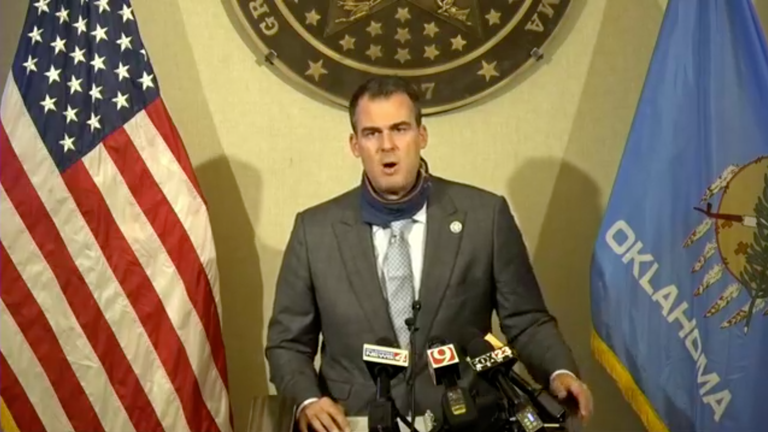
Budget & Tax , Education
Ray Carter | October 23, 2020
AG concludes Stitt’s scholarship program is legal
Ray Carter
A legal analysis released by the Office of the Oklahoma Attorney General concludes that Gov. Kevin Stitt complied with federal law when he authorized use of some federal funds for scholarships that help low-income children attend private school.
The analysis was released in response to a request from a group of state House Democrats who opposed provision of that aid to those families.
In the spring, Congress passed the federal Coronavirus Aid, Relief, and Economic Security (CARES) Act, which provided hundreds of millions of dollars to the state of Oklahoma. The law directed a share of that money to the Governor’s Emergency Education Relief (GEER) Fund, which is controlled by each state’s governor.
Stitt opted to use a portion of Oklahoma’s GEER Fund money for his “Stay in School” initiative, which provides low-income children up to $6,500 apiece to attend private schools. The program was expected to benefit more than 1,500 Oklahoma families.
In a letter sent earlier this year to the attorney general’s office, Democratic lawmakers asked if the governor’s action complied with federal law and, if not, asked the attorney general to issue an opinion “that the $38 million in GEER funds received by Oklahoma be redirected” to other uses.
Such a redirection would have involved seizing scholarship funds from thousands of low-income families who have been awarded the grants in recent weeks.
The legal analysis by Ethan Shaner, deputy general counsel at the Office of the Oklahoma Attorney General, noted that the CARES Act allows for grants to be made from the GEER Fund to “provide support” to a range of educational entities, including any “education related entity within the State that the Governor deems essential for carrying out emergency educational services to students for authorized activities.” The phrase “education related entity” encompasses private schools.
The analysis also noted that that the federal law allows GEER funds to be provided to private schools for goals that include the “social and emotional support” of affected students.
The analysis concluded the use of GEER funds authorized by Stitt appears “to be permissible” under the provisions of the federal law, and notes that the CARES Act “does not limit” beneficiaries of GEER funding “to only public bodies,” and that guidance from the U.S. Department of Education “provides that education-related entities can include private non-profit organizations.”
A Stitt spokesman said the analysis’ conclusion is not surprising.
“Governor Stitt appreciates the work of the Attorney General’s Office to look into these issues and is pleased to find the allegations made by House Democrats have no merit whatsoever,” said Charlie Hannema, chief of communications for Gov. Kevin Stitt. “However, this was clear from the beginning, and could have been quickly explained had the House Democrats called our office before tying up state legal resources.”
Programs comparable to Stitt’s “Stay in School” initiative have been upheld by both the Oklahoma Supreme Court and the U.S. Supreme Court.
Earlier this year, the U.S. Supreme Court ruled that a tax-credit program that supported private-school scholarships in Montana did not violate the Free Exercise Clause of the Federal Constitution.
The opinion stated, “We have repeatedly held that the Establishment Clause is not offended when religious observers and organizations benefit from neutral government programs.” It also said objections raised by opponents of the program were “particularly unavailing because the government support makes its way to religious schools only as a result of Montanans independently choosing to spend their scholarships at such schools.”
A similar conclusion was reach when opponents of the Lindsey Nicole Henry Scholarships for Students with Disabilities Program Act, which provides taxpayer-funded private-school scholarships to children with special needs and foster children, claimed that program violated a provision of the Oklahoma Constitution that bans the expenditure of taxpayer funds “directly or indirectly” for the benefit “of any sect, church, denomination, or system of religion.”
The Oklahoma Supreme Court, in a unanimous 2016 decision, held the scholarship program was constitutional.
“When the parents and not the government are the ones determining which private school offers the best learning environment for their child, the circuit between government and religion is broken,” the justices stated [emphasis in original].

Ray Carter
Director, Center for Independent Journalism
Ray Carter is the director of OCPA’s Center for Independent Journalism. He has two decades of experience in journalism and communications. He previously served as senior Capitol reporter for The Journal Record, media director for the Oklahoma House of Representatives, and chief editorial writer at The Oklahoman. As a reporter for The Journal Record, Carter received 12 Carl Rogan Awards in four years—including awards for investigative reporting, general news reporting, feature writing, spot news reporting, business reporting, and sports reporting. While at The Oklahoman, he was the recipient of several awards, including first place in the editorial writing category of the Associated Press/Oklahoma News Executives Carl Rogan Memorial News Excellence Competition for an editorial on the history of racism in the Oklahoma legislature.